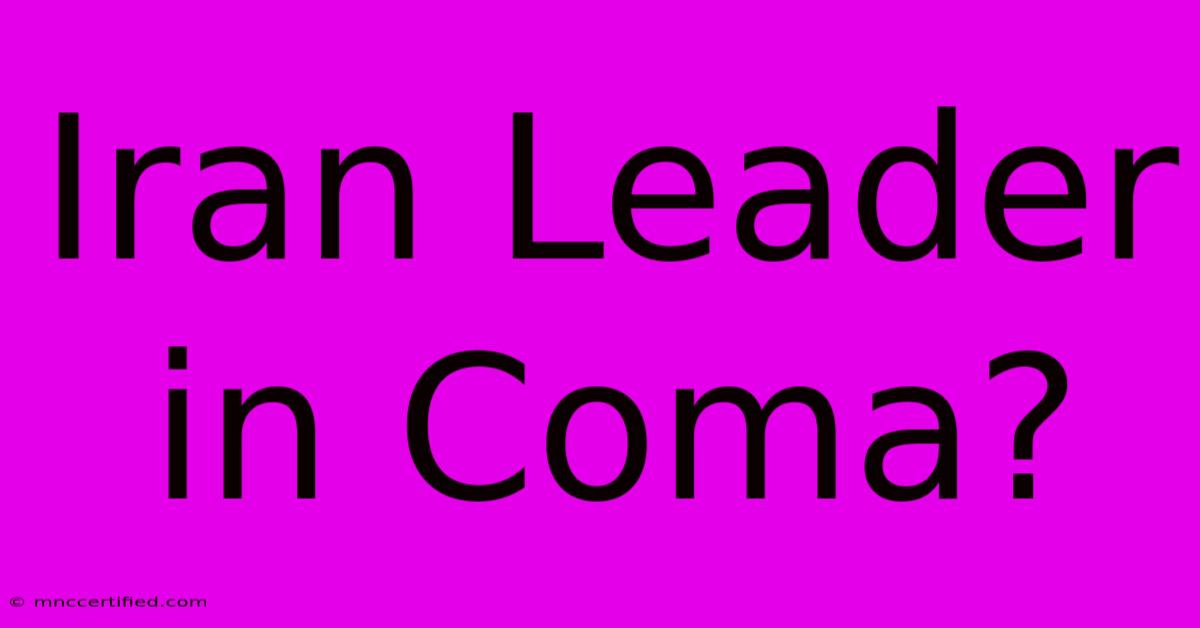Iran Leader In Coma?

Table of Contents
Iran Leader in Coma? Separating Fact from Speculation
The health of Iranian Supreme Leader Ayatollah Ali Khamenei is a topic frequently subject to rumors and speculation, particularly online. Claims about him being in a coma, while circulating periodically, often lack credible evidence. This article aims to examine the available information, analyze the sources, and separate fact from the pervasive misinformation surrounding this sensitive issue.
The Challenges of Verifying Information about Khamenei's Health
Verifying information about the Supreme Leader's health is incredibly difficult. The Iranian government maintains strict control over information, limiting independent reporting and making it challenging for journalists and analysts to access reliable sources. Official statements are often vague, adding to the ambiguity and fueling speculation. Any news originating from unofficial or anonymous sources should be treated with extreme caution.
The Importance of Reliable Sources
When assessing claims about Khamenei's health, relying on reputable news organizations with a history of accurate reporting is crucial. These sources often have established networks of contacts and rigorous fact-checking processes. Be wary of social media posts, unverified blogs, and websites known for spreading misinformation or propaganda. Cross-referencing information from multiple credible sources is also essential to build a more comprehensive and accurate understanding.
Analyzing the Recurring "Coma" Claims
Rumors about Ayatollah Khamenei being in a coma have surfaced repeatedly over the years. These claims often lack supporting evidence and are frequently amplified by those with political agendas or anti-Iranian sentiments. The absence of confirmation from credible sources, coupled with the Iranian government's tight control over information, casts significant doubt on the validity of these assertions.
The Role of Geopolitical Context
The timing of these rumors is often linked to significant geopolitical events involving Iran. Periods of heightened international tension or internal political instability can see a surge in speculation about the Supreme Leader's health, suggesting that the rumors may be deliberately spread to create uncertainty or exploit existing anxieties.
Understanding the Implications of Misinformation
The spread of misinformation regarding Khamenei's health can have serious consequences. It can contribute to instability, both domestically and internationally. False reports can trigger market fluctuations, influence political decisions, and potentially exacerbate existing tensions. The deliberate dissemination of false information is a form of disinformation, posing a significant threat to credible journalism and public discourse.
Conclusion: The Need for Critical Thinking and Reliable Sources
Determining the true state of Ayatollah Khamenei's health requires a critical and discerning approach. Relying on credible news outlets, cross-referencing information, and considering the geopolitical context are essential to avoiding the spread of misinformation. While speculation will undoubtedly continue, prioritizing verifiable information is crucial for navigating this complex and often opaque situation. Until reliable evidence emerges from trusted sources, treating claims about his health as unsubstantiated rumors is the most responsible course of action.
Keywords: Iran Supreme Leader, Ayatollah Khamenei, health, coma, rumors, speculation, misinformation, disinformation, reliable sources, geopolitical context, credible news, Iranian politics, international relations.

Thank you for visiting our website wich cover about Iran Leader In Coma?. We hope the information provided has been useful to you. Feel free to contact us if you have any questions or need further assistance. See you next time and dont miss to bookmark.
Featured Posts
-
Son In Laws England Goal Keanes Response
Nov 18, 2024
-
Nfl Recap Titans 13 Vikings 23
Nov 18, 2024
-
Tulisas Post X Factor Life I M A Celeb Update
Nov 18, 2024
-
Ongoing Incident At Dublin Airport Warning
Nov 18, 2024
-
Steelers Defeat Ravens Game Recap
Nov 18, 2024